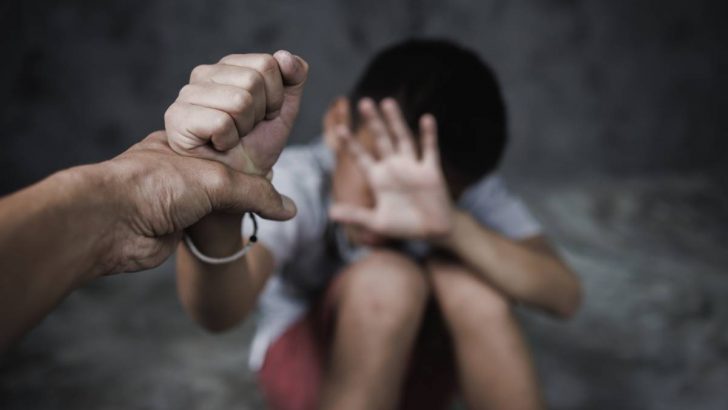Sometimes, tired, stressed, angry or worried parents react furiously to certain child behaviors.
They behave inappropriately in front of their offspring.
But in any other situation, they wouldn’t have acted this way.
The parents’ mood is an important factor that determines not only the child’s behavior, but also the parents’ reaction to the child’s behavior.
In fact, when parents’ moods are unpredictable, children feel anxious.
Indeed, when parents pay no attention to a child’s behavior one day, and the next day get angry about the same behavior, the child feels confused.
When parents get angry with the child because they’re worried about something else, the child is angry because the parents have treated him unfairly.
The parents’ anger and aggressive behavior make the child feel threatened.
In this case, the child is frightened by his parents’ bad temper.
In fact, parents’ bad temper causes children to associate it with themselves and feel guilty.
So it’s important for parents to take care of themselves and solve their problems constructively, which won’t harm their children.
Parental anger is what scares children most

Stress is a normative element of parenthood.
Parents are often expected to feel frustrated or frightened when raising a child, and sometimes these feelings provoke anger.
Parents usually get angry when they think the child is deliberately misbehaving.
If the parents think the child can control his feelings and behavior, but he’s not doing it on purpose, because he wants to annoy and irritate the parents, there’s a good chance that such an interpretation of the child’s behavior will provoke anger.
The child is frightened by the parents’ anger, because it’s not the reaction they expect.
Parents need to know that small children think and feel differently, that they don’t connect cause and effect as adults do, and that they connect everything that happens around them with themselves.
Little children have no empathy, they don’t understand how their parents feel.
They don’t know what will make their parents angry, but they try to understand it.
Besides, growing up is stressful.

Children face frustrations every day, because things don’t go the way they want and expect.
Children need to learn from their parents how to deal with frustrations, how to behave when they’re angry.
This is what enables them to progress gradually.
They need time to fully understand what their parents are trying to teach them.
But understanding them is the key to achieving the long-term goals of education.
Parents sometimes want to change their children’s behavior by telling them that they are bad, ill-behaved, clumsy, immature or incompetent.
When children hear such criticism, they feel rejected.
If the child sees himself as bad, he will probably do things that his parents consider bad.
If children see themselves as incapable, they are unlikely to try to learn new skills.
Children learn EVERY DAY.
They rely on their parents to acquire knowledge and skills.
So they need encouragement and support from their parents.
Here’s what parents need to know

Children with high self-esteem do better, because they’re more motivated to try and aren’t afraid of failure.
They’re happier because they feel good about their ability to cope with failure.
What’s more, they have a better relationship with their parents, because they know that their parents believe in them.
Parents build their children’s self-esteem by recognizing and appreciating their children’s efforts, even when they’re not the most successful.
So it’s important to appreciate the child’s desire to help, supporting them even when they fail and encouraging them to try again, recognizing and emphasizing idiosyncrasies.
Parents think the child will learn an important lesson (not to repeat the undesired behavior) if they hit him.
What children learn from corporal punishment is:
1. Hitting is an acceptable response to anger.
2. People they trust and expect to protect them will hurt them.
3. They should fear their parents instead of trusting them and expecting them to help them and teach them important things.
4. Their home is a dangerous place for learning and research.
In fact, parents need to think about what they want to teach their child in the long term.
If they want to teach him to be non-violent, they need to show him how to be non-violent.
Besides, parents should think about what it’s like to be hit as an adult.
If someone came and punched them, they’d feel humiliated.
We learn the most important things in the most difficult situations…

We’re not motivated to please the person who hit us, we feel resentment, fear, and sometimes, we want revenge.
1. Count to 10 before you say or do anything.
If you’re still angry, walk away, leave the room and give yourself time to calm down.
2. Relax your shoulders, breathe deeply and repeat a soothing phrase to yourself.
3. Don’t say anything until you’ve calmed down.
4. Take a time-out.
Tell the child and yourself that his behavior has made you angry, and that you won’t talk about it until you’ve calmed down.
5. Reflect on the situation.
Think about why your child might have behaved as he did.
Look at the situation from your child’s point of view.
Propose a response that respects the situation from the child’s point of view and in which you explain to the child what made you angry.
6. Talk to the child about what happened when you planned a response that includes your long-term goals, shows the child that you love him/her, takes into account how the child thinks and feels, but gives him/her a clear order and structure.
7. Remember that the situation represents an opportunity for the child to learn to resolve conflicts through communication and the problem-solving process.
Understand anger as a sign that you and your child don’t understand each other’s points of view, which means you need to re-establish communication based on understanding.
Don’t let your anger lead you to say something mean, ugly, criticize the child for being stupid, yell at him or hit him.
Don’t try to get even with the child because his behavior has irritated you.
Remember that we learn the most important things in the most difficult situations.
Take every opportunity to be the kind of person you want your child to become.

